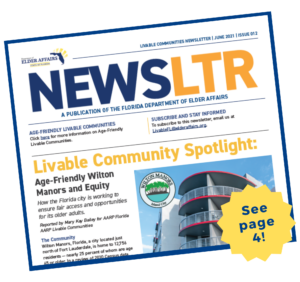 By Lisa Conway, Registered Nurse and Certified Care Manager
By Lisa Conway, Registered Nurse and Certified Care Manager
Senior Partner Care Services, Once Senior Place, Viera
The National Institutes of Health (NIH) predicts that people 65 and over will comprise nearly 17 percent of the world’s population by 2050 (1.6 billion). As declared by the United Nations General Assembly, June 15th is designated as World Elder Abuse Awareness Day. Global and regional events take place throughout the month. This day represents one day in the year where nations of the globe officially voice their opposition to the abuse, suffering, and neglect inflicted upon our elder population. World Elder Abuse Awareness Day is also a time to educate others and reflect on our duty to protect this vulnerable aging segment of our society.
The World Health Organization describes elder abuse as “a violation of human rights and a significant cause of illness, loss of productivity, isolation and despair.” More specifically, elder abuse is the mistreatment of an older person by someone (typically) in a position of trust. This may be a partner, family member, friend, or caregiver. Elder abuse can be emotional, physical, sexual, financial, or mistreatment by neglect, self-neglect, or abandonment.
Financial abuse is the fastest growing and most common type of abuse affecting older adults and is categorized as theft, fraud, or electronic exploitation. Theft may extend from the outright stealing of money and valuables to medications and more. Fraud includes acts of dishonesty, falsification of records, or forgery. Electronic exploitation may take the form of suspicious emails or calls that lead to the victim surrendering their passwords or personal information.
Elder abuse is a global issue affecting seniors. Both men and women, rich and poor are victims of elder abuse. And it is increasing. As the population
of many countries continues to age, elder abuse continues to rise.
Sadly, only one in six cases of elder abuse is ever reported. If you suspect elder abuse, it is always best to err on the side of the elder and let the authorities make the determination.
Physical abuse leaves clues. Unexplained bruises, welts, burns or lacerations, difficulty walking or sitting, bloody undergarments, emaciation, or unexplained pain should be reported. Any time you witness a life-threatening situation, you should immediately call 911.
If elder abuse— of any kind— is suspected in Florida, it should be reported to the Department of Children and Families Florida Abuse Hotline by calling 1-800-96-ABUSE (1-800-962-2873), or online at reportabuse.dcf.state.fl.us. Similar to the provisions of Florida’s “Good Samaritan law,” anyone reporting abuse in good faith is immune from civil or criminal liability. Your actions could literally save a life.
One Senior Place is a marketplace for resources and provider of information, advice, care and on-site services for seniors and their families. Questions for this column are answered by professionals in nursing, social work, care management and in-home care. Send questions to askOSP@OneSeniorPlace.com, call 321-751-6771 or visit One Senior Place, The Experts in Aging at OneSeniorPlace.com.



